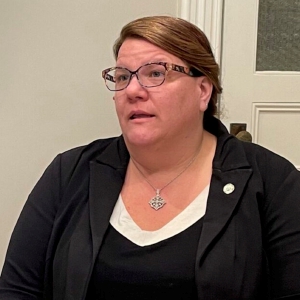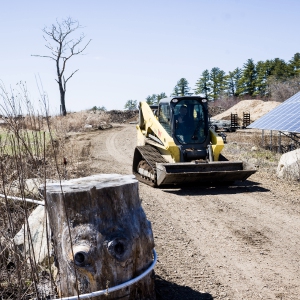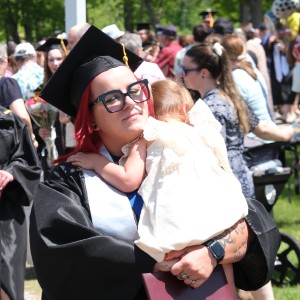Parenting from Prison: Sentenced for murder, father still a role model to children
| Published: 01-16-2017 4:52 PM |
Growing up, Evenor and Natalia Pineda couldn’t hug their father and say “I love you” before bed. Instead, the young children clung to the sound of his voice, which he recorded from prison to CDs that accompanied books of their favorite stories.
“We would listen to them before we’d go to bed and just let it play the whole night, and it was amazing,” Evenor, who is now 15, said while seated with his sister in the living room of their grandparents’ Nashua home.
Evenor was 3 years old and Natalia almost 2 when their father, Evenor Pineda, was arrested and charged with fatally stabbing a fellow gang member. The elder Evenor Pineda, 34, has served nearly 12 years in prison for the crime of second-degree murder and could be incarcerated for another six years.
“We don’t remember a lot when we were younger and he was home,” the younger Evenor said.
He was told that he and his sister would wait anxiously by the front door at night for their father’s return, and pounce when it opened. Then, they’d jump on their dad’s feet and make him walk across the room as they held on tight.
The children’s mother has been in and out of their lives, and was also previously incarcerated out of state, relatives said. She now lives in the Chicago area.
“My grandparents have custody of us,” Natalia, 13, said as she turned her attention from her math homework to the family photos framed on the wall. One above the couch was of her dad from years ago.
Article continues after...
Yesterday's Most Read Articles
 Helen Hanks resigns as Department of Corrections commissioner
Helen Hanks resigns as Department of Corrections commissioner
 Historic Tilton Island Park Bridge will be reopened unless Trump takes back a federal grant
Historic Tilton Island Park Bridge will be reopened unless Trump takes back a federal grant
 ‘I thought we had some more time’ – Coping with the murder-suicide of a young Pembroke mother and son
‘I thought we had some more time’ – Coping with the murder-suicide of a young Pembroke mother and son
 As Canadian travel to the U.S. falls, North Country businesses are eyeing this Victoria Day weekend to predict impacts in New Hampshire
As Canadian travel to the U.S. falls, North Country businesses are eyeing this Victoria Day weekend to predict impacts in New Hampshire
 Owners of Lewis Farm prepare to bring back agritourism after long dispute with city of Concord
Owners of Lewis Farm prepare to bring back agritourism after long dispute with city of Concord
The elder Evenor Pineda’s mother, Rosa Levesque, and her husband, Norman Levesque, said they didn’t second-guess their decision to care for grandchildren Evenor and Natalia in their father’s absence. The Levesques make sure the teenagers see their father on a regular basis, both in person and by Skype. Pineda also mails cards and letters and calls home.
“I try to be a positive role model, even from behind these walls,” he said during a recent interview at the Concord prison. “I’m fortunate that I have numbers and not life sentences. I know I can go home in six years – maybe sooner. My motivating factor for going home is my children.”
Sitting in a classroom of the Family Connections Center, Pineda described the man who entered the prison a decade ago as selfish, simple-minded, and not as involved in his children’s lives as he should have been. Today, he prioritizes his responsibilities as a father.
“I thought about hanging in the streets, having time with my boys, going to the projects and getting high,” he said. “I thought I was a family guy and a street guy. You can’t be both. This is what happens. You end up in prison.”
Pineda said he didn’t have a positive male role model to look up to because his biological father was absent. He developed a skewed understanding of a father’s role, which he defined simply as the breadwinner – someone who pays the bills, clothes the children and makes sure they have shelter.
Since his incarceration, Pineda has completed parenting classes through the Family Connections Center and says he has come to understand the importance of spending quality time with his children, even though he must do so from afar.
For young Evenor and Natalia, their relationship with their father has been a work in progress and a lesson in patience. The longer he was away, the more they wondered whether he was telling them the complete story of his arrest and, if not, why he was withholding certain information.
“He said he was in a fight, but he didn’t give much detail,” Evenor recalled. “I always knew there were extra details.”
No one is sentenced to more than a decade in prison for a simple fight, he said. People fight every day.
Natalia routinely asked her dad about the reason for his incarceration, hoping maybe one day he’d “crack” and accidentally tell her a different story – the full story.
“When people lie and try to make up a story, they tell it different. He always kept it the same,” she said.
That is until roughly a year or two ago when Pineda opened up and told his children about the murder conviction. He said something happened with his daughter in school and he knew in his gut it was time to disclose the details of his past.
Natalia said when she learned the complete truth, she felt better, not worse. Evenor nodded his head in agreement.
As a result of their dad’s experience, the siblings say they’ve learned valuable life lessons, including “to use your words for love and truth and not for violence,” Evenor said.
“He’s the one who tells us what path you need to take,” Natalia added. “Do you want to be on a path in a dark alley and you don’t know what’s going to be there, or do you want a path that tells us the directions?”
When Pineda was first incarcerated, he often second-guessed himself and worried about how his absence would affect his relationship with his children, in both the short and the long term. He said their bond has been tested, but ultimately “it was like I never left.”
He has seen other men around him give up on being fathers simply because they are incarcerated. For him, it was never an option.
“It’s a shame to see guys drowning in here, and they’ll take you with them if you get too close.”
After Pineda’s arrest in 2005, he awaited the resolution of his case from the Valley Street jail in Manchester. He said he vividly remembers the first time his children, then toddlers, came to visit with his mother and the remorse he felt deep in his gut.
Pineda was behind glass, and rather than talk to their dad through it, the children tried everything in their power to climb over it to get to him.
“I said, ‘I can’t do this,’ ” Pineda said, adding that he’d told his family he wanted to wait until he was in prison to visit with Evenor and Natalia.
Natalia, too, recalled that story, which was retold to her at an older age. She outstretched one of her arms as if placing it on the glass, now invisible, that separated her from her father so many years ago. That was the first time she saw her dad cry.
“Everyone is their own person and everyone makes mistakes. If anyone was perfect, they’re not human,” Natalia said. “The parent I see right in front of me, that’s my role model, no matter what they did, and I’ll always love them. It’s okay to have a parent in prison. It’s not something you should be ashamed of. That’s saying you don’t have a parent, that they don’t count. They do.”
Evenor and Natalia hope that, by talking about how their father’s incarceration changed their lives, they can help other kids in similar circumstances succeed, and not be so afraid.
The brother and sister were among a handful of children interviewed for a short film shown to approximately 250 attendees of the “Counting the Days” conference, presented this past October by Child and Family Services and the Family Connections Center. At the daylong conference, corrections and law enforcement officials, child and family therapists, social workers, educators, legislators, and youth mentors focused on the needs of children experiencing parental incarceration.
Pineda said he has always tried to be as up-front as possible with his children, and explain to them that they are in a very “nontraditional” situation. And that’s true for his mom and stepdad, too.
“They’re doing this sentence with me, because they have to be parents all over again,” he said. “I understand it’s a struggle for everyone. … I have to be thankful because they don’t have to be taking care of them; it’s a choice and they made that.”
But that choice was not difficult to make, his mother, Rosa Levesque said. She could never have left the children and been okay with doing so.
“There’s no way we can live in peace like that. It’d be so hard. I’d be suffering from anxiety, not knowing how they’re doing,” she said. “I promised myself that I would be there for my kids. That’s why I’m there for them.”
Imprisonment, though difficult, has been good for her son, Levesque said. He has matured and become a better father, and he is preparing himself for the transition that he will ultimately make back into the community, she said.
Evenor and Natalia have big dreams for that day, the day their dad comes home. Natalia said she wants to take him to a mall, where there is a big game room so he can play games from his childhood. Evenor said he knows his dad is eager to go camping and spend some quality time as a family outdoors.
“When he gets out, anything would be fun,” Evenor said. “Just having a meal with him would be perfect.”
(Alyssa Dandrea can be reached at 369-3319, adandrea@cmonitor.com or on Twitter @_ADandrea.)
]]>







 ‘We chose to become more’: NHTI holds 75th commencement
‘We chose to become more’: NHTI holds 75th commencement ‘I hate to leave’: Three-alarm fire in Loudon burns centuries-old home to the ground
‘I hate to leave’: Three-alarm fire in Loudon burns centuries-old home to the ground Photos: Signs of spring
Photos: Signs of spring
